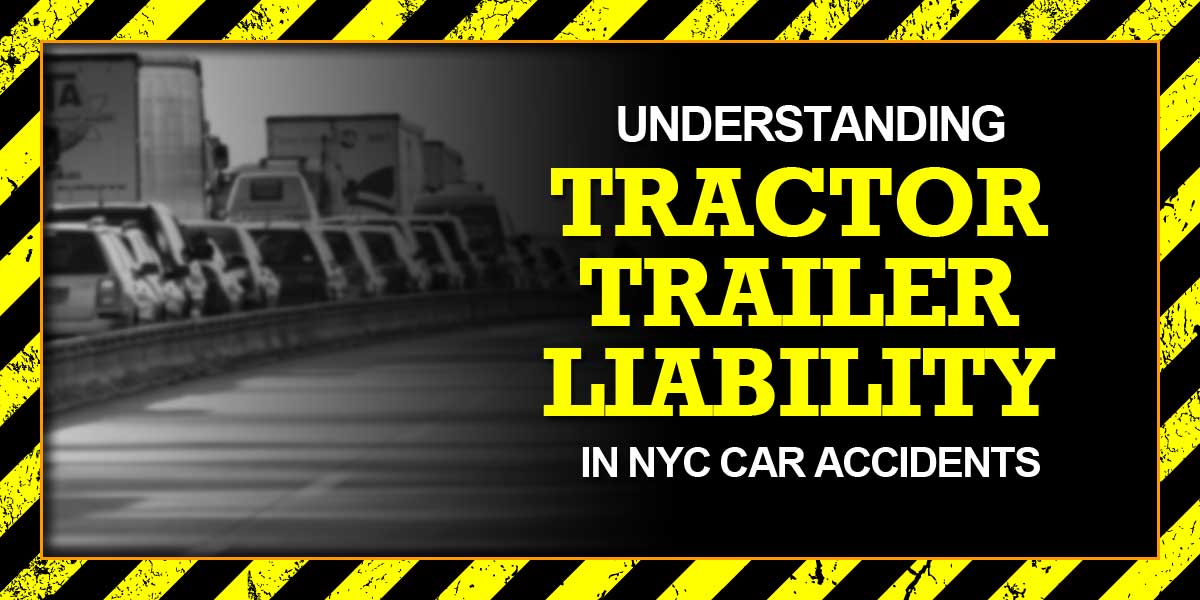Tractor-trailer accidents are often devastating due to the size and weight of these massive vehicles. In the bustling highways of New York City, these accidents can cause severe injuries and extensive property damage. Understanding the intricacies of liability in such accidents is crucial for victims seeking justice and compensation. This guide provides a comprehensive overview of the essential steps to take immediately after a truck accident and the complexities of establishing liability.
Top 5 Things to Worry About Right After an Accident on a Highway with a Truck
1. Safety and Health
Immediate Actions
Your first priority after a tractor-trailer accident should be ensuring the safety of all involved. If possible, move vehicles to a safer location to prevent further collisions and call 911 immediately. Reporting the accident promptly allows emergency services to arrive quickly and provide necessary medical assistance.
Medical Attention
Even if injuries appear minor, seek medical attention right away. Some injuries, like whiplash or internal bleeding, may not be immediately noticeable but can become serious if left untreated. Prompt medical evaluation is crucial not only for your health but also for any future legal claims.
2. Documentation and Evidence Collection
Photographs
Take comprehensive photographs of the accident scene. Include images of all involved vehicles, their positions, visible damages, road conditions, skid marks, and relevant traffic signs. These photos serve as vital evidence when determining fault and the extent of damages.
Witness Information
Collect contact information from any witnesses at the scene. Witness statements can be instrumental in corroborating your account of the accident and establishing the facts.
Police Report
Ensure that a police report is filed and obtain a copy as soon as it’s available. This report documents crucial details of the accident and may include initial assessments of fault, which can be beneficial in legal proceedings.
3. Information Exchange
Driver and Vehicle Details
Exchange information with the truck driver, including names, addresses, phone numbers, driver’s license numbers, vehicle registration details, and insurance information. Accurate and complete information is vital for insurance claims and legal actions.
Trucking Company Details
Obtain details about the trucking company, including its name, contact information, and the truck’s USDOT number. This information is essential for any liability claims against the company, as they may be responsible for the driver’s actions or vehicle maintenance.
4. Legal and Insurance Considerations
Notify Insurance
Report the accident to your insurance company as soon as possible, providing all collected information and documentation. Early notification can help expedite the claims process and ensure that your rights are protected.
Avoid Admission of Fault
Do not admit fault at the scene of the accident. Liability in truck accidents can be complex and often requires a thorough investigation to determine all contributing factors. Admitting fault prematurely can undermine your legal position.
Consult an Attorney
Given the complexity of tractor-trailer accident cases, consulting a personal injury attorney experienced in truck accidents is highly advisable. An attorney can help navigate the legal process, protect your rights, and maximize your potential compensation.
5. Preservation of Evidence
Black Box Data
Trucks are typically equipped with event data recorders (EDRs) or “black boxes” that record crucial information such as speed, braking patterns, and engine performance. Ensure that this data is preserved, as it can provide critical insights into the cause of the accident.
Driver’s Logs and Records
Truck drivers must maintain logs of their driving hours and breaks. These records can help determine if driver fatigue or violations of hours-of-service regulations contributed to the accident.
Maintenance Records
Obtain maintenance and inspection records for the truck. These documents can reveal potential mechanical issues or lack of proper upkeep that may have played a role in the accident.
Conclusion
Tractor-trailer accidents on NYC highways involve complex liability issues, often requiring extensive investigation and legal expertise. Prioritizing immediate safety, collecting thorough documentation, and seeking professional legal advice are critical steps to take in the aftermath of such incidents. By addressing these key concerns, you can better protect your rights and interests in the challenging process that follows a truck accident.
